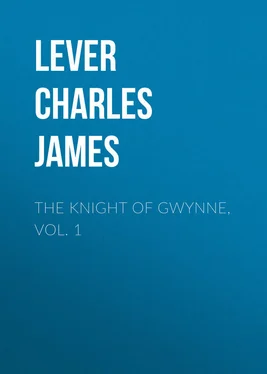Charles Lever - The Knight Of Gwynne, Vol. 1
Здесь есть возможность читать онлайн «Charles Lever - The Knight Of Gwynne, Vol. 1» — ознакомительный отрывок электронной книги совершенно бесплатно, а после прочтения отрывка купить полную версию. В некоторых случаях можно слушать аудио, скачать через торрент в формате fb2 и присутствует краткое содержание. Жанр: foreign_antique, foreign_prose, на английском языке. Описание произведения, (предисловие) а так же отзывы посетителей доступны на портале библиотеки ЛибКат.
- Название:The Knight Of Gwynne, Vol. 1
- Автор:
- Жанр:
- Год:неизвестен
- ISBN:нет данных
- Рейтинг книги:3 / 5. Голосов: 1
-
Избранное:Добавить в избранное
- Отзывы:
-
Ваша оценка:
- 60
- 1
- 2
- 3
- 4
- 5
The Knight Of Gwynne, Vol. 1: краткое содержание, описание и аннотация
Предлагаем к чтению аннотацию, описание, краткое содержание или предисловие (зависит от того, что написал сам автор книги «The Knight Of Gwynne, Vol. 1»). Если вы не нашли необходимую информацию о книге — напишите в комментариях, мы постараемся отыскать её.
The Knight Of Gwynne, Vol. 1 — читать онлайн ознакомительный отрывок
Ниже представлен текст книги, разбитый по страницам. Система сохранения места последней прочитанной страницы, позволяет с удобством читать онлайн бесплатно книгу «The Knight Of Gwynne, Vol. 1», без необходимости каждый раз заново искать на чём Вы остановились. Поставьте закладку, и сможете в любой момент перейти на страницу, на которой закончили чтение.
Интервал:
Закладка:
Charles James Lever
The Knight Of Gwynne, Vol. 1 (of 2)
I wrote this story in the Tyrol. The accident of my residence there was in this wise: I had travelled about the Continent for a considerable time in company with my family with my own horses. Our carriage was a large and comfortable calèche, and our team, four horses; the leaders of which, well-bred and thriving-looking, served as saddle horses when needed.
There was something very gypsy-like in this roving, uncertain existence, that had no positive bent or limit, and left every choice of place an open question, that gave me intense enjoyment. It opened to me views of Continental life, scenery, people and habits I should certainly never have attained to by other modes of travel.
Not only were our journeys necessarily short each day, but we frequently sojourned in little villages, and out-of-the-world spots, where, if pleased by the place itself, and the accommodation afforded, we would linger on for days, having at our disposal the total liberty of our time, and all our nearest belongings around us.
In the course of these rambles we had arrived at the town of Bregenz, on the Lake of Constance; where the innkeeper, to whom I was known, accosted me with all the easy freedom of his calling, and half-jestingly alluded to my mode of travelling as a most unsatisfactory and wasteful way of life, which could never turn out profitably to myself or to mine. From the window where we were standing as we talked, I could descry the tall summit of an ancient castle, or schloss, about two miles away; and rather to divert my antagonist from his argument than with any more serious purpose, I laughingly told my host, if he could secure me such a fine old chateau as that I then looked at, I should stable my nags and rest where I was. On the following day, thinking of nothing less than my late conversation, the host entered my room to assure me that he had been over to the castle, had seen the baron, and learned that he would have no objection to lease me his chateau, provided I took it for a fixed term, and with all its accessories, not only of furniture but cows and farm requisites. One of my horses, accidentally pricked in shoeing, had obliged me at the moment to delay a day or two at the inn, and for want of better to do, though without the most remote intention of becoming a tenant of the castle, I yielded so far to my host’s solicitation, – to walk over and see it.
If the building itself was far from faultless it was spacious and convenient, and its position on a low hill in the middle of a lawn finer than anything I can convey; the four sides of the schloss commanding four distinct and perfectly dissimilar views. By the north it looked over a wooded plain, on which stood the Convent of Mehreran; and beyond this, the broad expanse of the Lake of Constance. The south opened a view towards the Upper Rhine, and the valley that led to the Via Mala. On the east you saw the Gebhardsberg and its chapel, and the lovely orchards that bordered Bregenz; while to the west rose the magnificent Lenten and the range of the Swiss Alps, – their summits lost in the clouds.
I was so enchanted by the glorious panorama around me, and so carried away by the thought of a life of quiet labor and rest in such a spot, that after hearing a very specious account of the varied economies I should secure by this choice of a residence, and the resources I should have in excursions on all sides, that I actually contracted to take the chateau, and became master of the Rieden Schloss from that day.
Having thus explained by what chance I came to pitch my home in this little-visited spot, I have no mind to dwell further on my Tyrol experiences than as they concern the story which I wrote there.
If the scene in which I was living, the dress of the peasants, the daily ways and interests had been my prompters, I could not have addressed myself to an Irish theme; but long before I had come to settle at Predeislarg, when wandering amongst the Rhine villages, on the vine-clad slopes of the Bergstrasse, I had been turning over in my mind the Union period of Ireland as the era for a story. It was a time essentially rich in the men we are proud of as a people, and peculiarly abounding in traits of self-denial and devotion which, in the corruption of a few, have been totally lost sight of; the very patriotism of the time having been stigmatized as factious opposition, or unreasoning resistance to wiser counsels. That nearly every man of ability in the land was against the Minister, that not only all the intellect of Ireland, but all the high spirit of its squirearchy, and the generous impulses of its people, were opposed to the Union, – there is no denying. If eloquent appeal and powerful argument could have saved a nation, Henry Grattan or Plunkett would not have spoken in vain; but the measure was decreed before it was debated, and the annexation of Ireland was made a Cabinet decision before it came to Irishmen to discuss it.
I had no presumption to imagine I could throw any new light on the history of the period, or illustrate the story of the measure by any novel details; but I thought it would not be uninteresting to sketch the era itself; what aspect society presented; how the country gentleman of the time bore himself in the midst of solicitations and temptings the most urgent and insidious; what, in fact, was the character of that man whom no national misfortunes could subdue, no Ministerial blandishments corrupt; of him, in short, that an authority with little bias to the land of his birth has called, — The First Gentleman of Europe .
I know well, I feel too acutely, how inadequately I have pictured what I desired to paint; but even now, after the interval of years, I look back on my poor attempt with the satisfaction of one whose aim was not ignoble. A longer and deeper experience of life has succeeded to the time since I wrote this story, but in no land nor amongst any people have I ever found the type of what we love to emblematize by the word Gentleman, so distinctly marked out as in the educated and travelled Irishman of that period. The same unswerving fidelity of friendship, the same courageous devotion to a cause, the same haughty contempt for all that was mean or unworthy; these, with the lighter accessories of genial temperament, joyous disposition, and a chivalrous respect for women, made up what I had at least in my mind when I tried to present to my readers my Knight of Gwynne.
That my character of him was not altogether ideal, I can give no better proof than the fact that during the course of the publication I received several letters from persons unknown to me, asking whether I had not drawn my portrait from this or that original, several concurring in the belief that I had taken as my model The Knight of Kerry, whose qualities, I am well assured, fully warranted the suspicion.
For my attempt to paint the social habits of the period, I had but to draw on my memory. In my boyish days I had heard much of that day, and was familiar with most of the names of its distinguished men. Anecdotes of Henry Grattan, Flood, Parsons, Ponsonby, and Curran jostled in my mind with stories of their immediate successors, the Bushes and the Plunketts, whose fame has come down to the very day we live in. As a boy, it was my fortune to listen to the narratives of the men who had been actors in the events of that exciting era, and who could even show me in modern Dublin the scenes where memorable events occurred, and not unfrequently the very houses where celebrated convivialities occurred. And thus from Drogheda Street, the modern Sackville Street, where the beaux of the day lounged in all their bravery, to the Circular road, where a long file of carriages, six in hand, evidenced the luxury and tone of display of the capital. I was deeply imbued with the features of the time, and ransacked the old newspapers and magazines with a zest which only great familiarity with the names of the leading characters could have inspired.
Читать дальшеИнтервал:
Закладка:
Похожие книги на «The Knight Of Gwynne, Vol. 1»
Представляем Вашему вниманию похожие книги на «The Knight Of Gwynne, Vol. 1» списком для выбора. Мы отобрали схожую по названию и смыслу литературу в надежде предоставить читателям больше вариантов отыскать новые, интересные, ещё непрочитанные произведения.
Обсуждение, отзывы о книге «The Knight Of Gwynne, Vol. 1» и просто собственные мнения читателей. Оставьте ваши комментарии, напишите, что Вы думаете о произведении, его смысле или главных героях. Укажите что конкретно понравилось, а что нет, и почему Вы так считаете.












